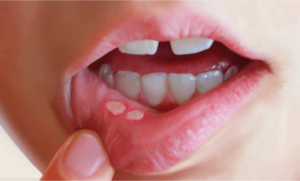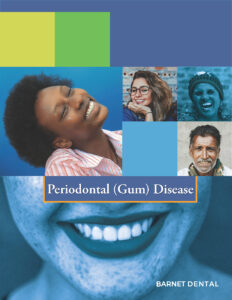What is it?
Canker sores, medically known as aphthous ulcers, are painful ulcers that develop on the mucous membranes inside the mouth. They are typically round or oval with a white or yellow center and a red border. Canker sores can occur singly or in clusters and can vary in size from a few millimeters to over a centimeter in diameter. These ulcers are common and can cause discomfort, especially when eating, drinking, or brushing teeth.
Here are some key points about canker sores:
- Symptoms: Canker sores can cause various symptoms, including:
- Pain or discomfort, which may range from mild to severe.
- Sensitivity to hot, spicy, or acidic foods and beverages.
- Difficulty chewing or swallowing, particularly if the canker sore is large or located in a sensitive area.
- Burning or tingling sensation before the appearance of the ulcer.
- Types:
- Minor canker sores: These are the most common type and are small, round ulcers that heal within 1 to 2 weeks without scarring.
- Major canker sores: These are larger and deeper than minor canker sores and may take several weeks to heal. They can leave scars.
- Herpetiform canker sores: These are clusters of multiple small ulcers that merge to form larger lesions. Despite the name, they are not caused by the herpes virus.
- Causes:
- The exact cause of canker sores is not fully understood, but they may be triggered by various factors, including:
- Minor trauma or injury to the oral tissues, such as biting the cheek or tongue.
- Hormonal changes, particularly in women during menstruation or pregnancy.
- Nutritional deficiencies, especially deficiencies in vitamin B12, iron, or folic acid.
- Stress or emotional factors.
- Certain foods or beverages, such as citrus fruits, spicy foods, or chocolate.
- Genetics: Some individuals may have a genetic predisposition to developing canker sores.
- Diagnosis:
- Diagnosis of canker sores is usually based on clinical examination and medical history.
- In some cases, a biopsy may be performed to rule out other potential causes of oral ulcers, such as oral cancer or autoimmune diseases.
- Treatment:
- Treatment of canker sores aims to alleviate symptoms and promote healing. Options may include:
- Over-the-counter topical medications, such as corticosteroid gels or pastes, to reduce pain and inflammation.
- Oral analgesics or pain relievers to help manage discomfort.
- Oral rinses containing antiseptic or numbing agents to provide temporary relief.
- Avoiding irritating foods or beverages that may exacerbate symptoms.
- Maintaining good oral hygiene practices, including regular brushing and flossing.
- Avoiding smoking and alcohol, which can irritate the oral tissues.
- Prevention:
- While canker sores cannot always be prevented, certain lifestyle modifications may help reduce the frequency or severity of outbreaks. These include:
- Maintaining a balanced diet rich in vitamins and minerals.
- Managing stress through relaxation techniques or counseling.
- Avoiding foods or substances that may trigger canker sores, if identified.
- Practicing good oral hygiene habits and using a soft-bristled toothbrush.
In summary, canker sores are painful ulcers that develop on the mucous membranes inside the mouth. They can vary in size and severity and may cause discomfort when eating, drinking, or performing oral hygiene. Treatment options aim to alleviate symptoms and promote healing, while lifestyle modifications may help reduce the frequency of outbreaks. If you experience persistent or severe canker sores, it’s essential to consult a healthcare professional for evaluation and appropriate management.

